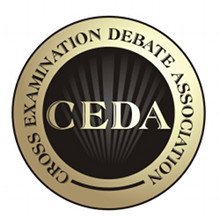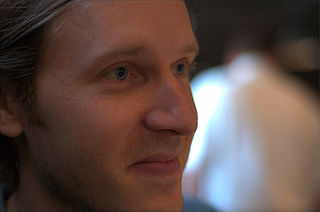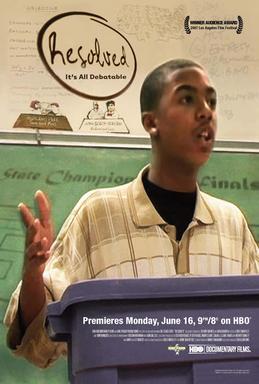
Debate is a process that involves formal discourse, discussion, and oral addresses on a particular topic or collection of topics, often with a moderator and an audience. In a debate, arguments are put forward for common opposing viewpoints. Debates have historically occurred in public meetings, academic institutions, debate halls, coffeehouses, competitions, and legislative assemblies. Debates have also been conducted for educational and recreational purposes, usually associated with educational establishments and debating societies. These debates emphasized logical consistency, factual accuracy, and emotional appeal to an audience. Modern forms of competitive debate also include rules for participants to discuss and decide upon the framework of the debate.

The University of Louisville (UofL) is a public research university in Louisville, Kentucky. It is part of the Kentucky state university system. When founded in 1798, it was one of the first city-owned public colleges in the United States and one of the first universities chartered west of the Allegheny Mountains. The university is mandated by the Kentucky General Assembly to be a "Preeminent Metropolitan Research University". It enrolls students from 118 of 120 Kentucky counties, all 50 U.S. states, and 116 countries around the world.
Policy debate is an American form of debate competition in which teams of two usually advocate for and against a resolution that typically calls for policy change by the United States federal government. It is also referred to as cross-examination debate because of the 3-minute questioning period following each constructive speech. Evidence presentation is a crucial part of policy debate. The main argument being debated during a round is to change or not change the status quo. When a team explains why their solvency is greater than the opposition's, they compare advantages. One team’s job is to argue that the resolution— the statement that we should make some specific change to a national or international problem —is a good idea. Affirmative teams generally present a plan as a proposal for implementation of the resolution. On the other hand, the Negative teams present arguments against the implementation of the resolution. In a single round of debate competition, each person gives two speeches. The first speech each person gives is called a “constructive” speech, because it is the speech when the first speaker positively, without rebuttal that has not occurred, presents the basic arguments they will make throughout the debate. The second speech is called a “rebuttal”, because this is the speech were each person tries to rebut the arguments made by the other team, while using their own arguments to try to convince the judge to vote for their team. The Affirmative has to convince the judge to vote for the resolution, while the Negative has to convince the judge the Negative's position is a better idea.

The National Educational Debate Association (NEDA) is an American collegiate debate association emphasizing audience-centered debate. It was founded by debate educators who believe that the debate tournament is an extension of the communication classroom and that even competitive debates should provide students with skills of research, argument selection, and presentation style that will benefit them as public advocates. NEDA schedules eight invitational tournaments a year, primarily in the mid-west. The association debates two resolutions per year. The fall resolution is one of value, and the spring resolution is one of policy.

The Louisville Cardinals are the NCAA athletic teams representing the University of Louisville. The Cardinals teams play in the Atlantic Coast Conference, beginning in the 2014 season. While playing in the Big East Conference from 2005 through 2013, the Cardinals captured 17 regular season Big East titles and 33 Big East Tournament titles totaling 50 Big East Championships across all sports. On November 28, 2012, Louisville received and accepted an invitation to join the Atlantic Coast Conference and became a participating member in all sports in 2014. In 2016, Lamar Jackson won the school its first Heisman Trophy.

The Cross Examination Debate Association (CEDA) is the largest intercollegiate policy debate association in the United States. Throughout the school year, CEDA sanctions over 60 tournaments throughout the nation, including an annual National Championship Tournament that brings together over 175 individual debate teams from across the nation to compete on the basis of research, persuasive speaking, argumentation, and philosophy.
The National Debate Tournament is one of the national championships for collegiate policy debate in the United States. The tournament is sponsored by the American Forensic Association with the Ford Motor Company Fund.

L&N Federal Credit Union Stadium, also known as L&N Stadium and formerly known as Cardinal Stadium and Papa John's Cardinal Stadium, is a football stadium located in Louisville, Kentucky, United States, on the southern end of the campus of the University of Louisville. Debuting in 1998, it serves as the home of the Louisville Cardinals football program. The official seating capacity in the quasi-horseshoe-shaped facility was 42,000 through the 2008 season. An expansion project that started after the 2008 season was completed in time for the 2010 season has brought the official capacity to 55,000. An additional expansion project aiming to close the open end of the horseshoe to add 6,000 additional seats was announced on August 28, 2015, and was completed in 2019.
There are several venues of competition for policy debate in the United States.
Inter-collegiate policy debate is a form of speech competition involving two teams of two debaters from different colleges or universities based on a resolution phrased as something the United States federal government "should" do. Policy debate also exists as a high school activity, with a very similar format, but different leagues, tournaments, speech times, resolutions, and styles.

The Louisville Cardinals football team represents the University of Louisville in the sport of American football. The Cardinals compete in the Football Bowl Subdivision (FBS) of the National Collegiate Athletic Association (NCAA) and compete in the Atlantic Coast Conference.

Jim Patterson Stadium is a baseball stadium in Louisville, Kentucky. It is the home field of the University of Louisville Cardinals college baseball team. It hosted the 2007 NCAA Super Regionals, where the Cardinals defeated Oklahoma State two games to one to advance to the College World Series in Omaha, Nebraska. Since then, the Cardinals have hosted an NCAA Division I Baseball Championship every year since the year of 2012. In 2016, the Cardinals ranked 27th among Division I baseball programs in attendance, averaging 2,606 per home game. Along with that, the Cardinals have been ranked in the top 10 amongst other collegiate baseball teams in the nation according to Baseball America. Coach Dan McDonnell has been the head coach of the Louisville Cardinals baseball team since the year of 2007 after coming from Ole Miss as an assistant coach. Since making his way to Louisville, he has led the team to four College World Series and seven NCAA Super Regionals.
Arthur Carmody IV is a former American football kicker. He played college football at Louisville.
The Louisville Cardinals men's basketball team is the men's college basketball program representing the University of Louisville in the Atlantic Coast Conference (ACC) of NCAA Division I. The Cardinals have officially won two NCAA championships in 1980 and 1986 ; and have officially been to 8 Final Fours in 39 official NCAA tournament appearances while compiling 61 tournament wins.

William John Sullivan is a software freedom activist, hacker, and writer. John was formerly executive director of the Free Software Foundation (FSF), where he has worked since early 2003. He is also a speaker and webmaster for the GNU Project. He also maintains the Plannermode and delicious-el packages for the GNU Emacs text editor.

Resolved is a 2007 documentary film concerning the world of high school policy debate. The film was written and directed by Greg Whiteley of New York Doll fame. The film captured the "Audience Award" title at its debut on June 23, 2007 at the Los Angeles Film Festival. The film was produced by One Potato Productions. The film made its television debut on HBO in the summer of 2008 and subsequently received two Emmy nominations: one nomination for Best Documentary; the other for Editing for the 2009 Emmy Awards held in September 2009. In July 2009, it was released on DVD by Image Entertainment.

The Emporia State Hornets are the athletic teams that represent Emporia State University (ESU). The women's basketball and softball teams use the name Lady Hornets. The university's athletic program fields 15 varsity teams in 11 sports all of whom have combined to win 50 conference championships as well as three national championships. Corky the Hornet serves as the mascot representing the teams, and the school colors are black and gold. Emporia State participates in the NCAA Division II and has been a member of the Mid-America Intercollegiate Athletics Association (MIAA) since 1991.

The 2004–05 Louisville Cardinals men's basketball team represented the University of Louisville during the 2004–05 NCAA Division I men's basketball season, Louisville's 91st season of intercollegiate competition. The Cardinals competed in Conference USA and were coached by Rick Pitino, who was in his fourth season. The team played home games at Freedom Hall.
This is a glossary of policy debate terms.

Competitive debate, also known as forensics or speech and debate, has a history in the United States dating back to colonial times. The practice, an import from British education, began as in-class exercises in which students would present arguments to their classmates about the nature of rhetoric. Over time, the nature of those conversations began to shift towards philosophical questions and current events, with Yale University being the first to allow students to defend any position on a topic they believed in. In the late nineteenth century, student-led literary societies began to compete with each other academically and often engaged in debates against each other. In 1906, the first intercollegiate debate league, Delta Sigma Rho, was formed, followed by several others. Competitive debate expanded to the secondary school level in 1920 with the founding of the National Speech and Debate Association, which grew to over 300,000 members by 1969. Technological advances such as the accessibility of personal computers in the 1990s and 2000s has led to debate cases becoming more complex and to evidence being more accessible.












